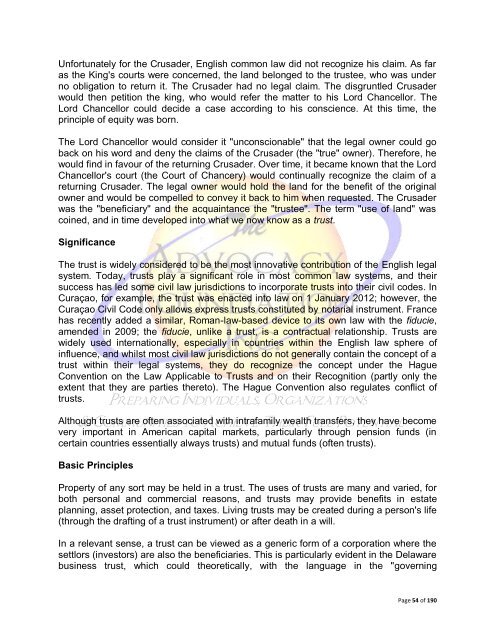Wills, Trusts & Estates
Wills, Trusts & Estates
Wills, Trusts & Estates
You also want an ePaper? Increase the reach of your titles
YUMPU automatically turns print PDFs into web optimized ePapers that Google loves.
Unfortunately for the Crusader, English common law did not recognize his claim. As far<br />
as the King's courts were concerned, the land belonged to the trustee, who was under<br />
no obligation to return it. The Crusader had no legal claim. The disgruntled Crusader<br />
would then petition the king, who would refer the matter to his Lord Chancellor. The<br />
Lord Chancellor could decide a case according to his conscience. At this time, the<br />
principle of equity was born.<br />
The Lord Chancellor would consider it "unconscionable" that the legal owner could go<br />
back on his word and deny the claims of the Crusader (the "true" owner). Therefore, he<br />
would find in favour of the returning Crusader. Over time, it became known that the Lord<br />
Chancellor's court (the Court of Chancery) would continually recognize the claim of a<br />
returning Crusader. The legal owner would hold the land for the benefit of the original<br />
owner and would be compelled to convey it back to him when requested. The Crusader<br />
was the "beneficiary" and the acquaintance the "trustee". The term "use of land" was<br />
coined, and in time developed into what we now know as a trust.<br />
Significance<br />
The trust is widely considered to be the most innovative contribution of the English legal<br />
system. Today, trusts play a significant role in most common law systems, and their<br />
success has led some civil law jurisdictions to incorporate trusts into their civil codes. In<br />
Curaçao, for ex<strong>amp</strong>le, the trust was enacted into law on 1 January 2012; however, the<br />
Curaçao Civil Code only allows express trusts constituted by notarial instrument. France<br />
has recently added a similar, Roman-law-based device to its own law with the fiducie,<br />
amended in 2009; the fiducie, unlike a trust, is a contractual relationship. <strong>Trusts</strong> are<br />
widely used internationally, especially in countries within the English law sphere of<br />
influence, and whilst most civil law jurisdictions do not generally contain the concept of a<br />
trust within their legal systems, they do recognize the concept under the Hague<br />
Convention on the Law Applicable to <strong>Trusts</strong> and on their Recognition (partly only the<br />
extent that they are parties thereto). The Hague Convention also regulates conflict of<br />
trusts.<br />
Although trusts are often associated with intrafamily wealth transfers, they have become<br />
very important in American capital markets, particularly through pension funds (in<br />
certain countries essentially always trusts) and mutual funds (often trusts).<br />
Basic Principles<br />
Property of any sort may be held in a trust. The uses of trusts are many and varied, for<br />
both personal and commercial reasons, and trusts may provide benefits in estate<br />
planning, asset protection, and taxes. Living trusts may be created during a person's life<br />
(through the drafting of a trust instrument) or after death in a will.<br />
In a relevant sense, a trust can be viewed as a generic form of a corporation where the<br />
settlors (investors) are also the beneficiaries. This is particularly evident in the Delaware<br />
business trust, which could theoretically, with the language in the "governing<br />
Page 54 of 190

















